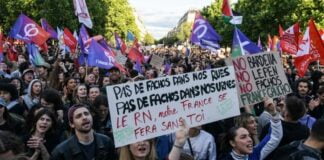Just hours after Donald Trump emerged victorious in the US presidential election, the German government collapsed, plunging the biggest economy in Europe into confusion.
The collapse comes after three years of dysfunctional and increasingly unpopular government from the country’s first three-party coalition.
As the German economy enters its second year of recession, the failure of centrist parties to address inflation and the cost-of-living crisis has fueled the rise of the far right. A radical left-wing intervention is urgently necessary.
After the 2021 federal election, the Social Democrats (SPD) and Greens were forced to invite the small, pro-business Free Democrats (FDP) into their cabinet to form a government.
The coalition was divided from the start, with the SPD Chancellor Olaf Scholz and the FDP finance minister Christian Lindner clashing over budget policy in the wake of the COVID-19 pandemic.
Its spending plans were too high for the FDP but too low to deliver on the SPD’s promises to improve living standards for workers and pensioners struggling with post-pandemic inflation.
The fallout from the Russian invasion of Ukraine only deepened the economic crisis. Germany, which had relied heavily on Russian natural gas, was hit very hard by the global increase in energy prices.
Cost of living
The result was the biggest collapse in German living standards since the Second World War and the biggest economic downturn since the 2008 financial crisis. Real wages slumped further in 2022 than in any year since 1950.
The failure of the government to address the cost-of-living crisis is a major factor in the rise of the far-right Alternative for Germany party (AfD).
In the September regional elections, the AfD nearly won Brandenburg, which the SPD has governed since 1990.
The party has viciously scapegoated migrants and refugees for the rising cost of living, demanding a complete halt to immigration for five years and calling for mass deportations.
It is increasingly dominated by barely-disguised Nazis in the party leadership.
The government coalition finally split during negotiations over the 2025 budget.
Chancellor Scholz wanted the government to increase borrowing, using the extra money to stimulate the industrial sector, under threat from Chinese competition, and continue funding weapons for Ukraine.
Car manufacturer Volkswagen has just announced factory closures that will mean thousands of job cuts as well as pay cuts of 10 per cent for the rest of its workers.
However, Lindner refused to take on more government debt, proposing a sweeping slate of pro-business reforms instead. On 6 November, Scholz sacked Lindner from the cabinet, leading the FDP to quit the coalition, robbing the government of its majority.
After publicly exchanging blame, the government announced that Scholz will face a vote of no confidence on 16 December, which he is expected to lose.
Snap elections will then be held on 23 February and, despite his unpopularity, Scholz plans to run again. The conservative Christian Democrats (CDU/CSU), currently polling at 32 per cent (twice as much as the SPD), are expected to win, although they too will likely be forced to form a coalition to reach a majority.
If no radical left-wing alternative is offered, the far right will continue to benefit from the dysfunction of the mainstream centrist parties. The AfD is currently polling at 18 per cent, making them the second most popular party in Germany.
Germany’s main left-wing parties have proven incapable of challenging the racism of the far right.
Sara Wagenknecht’s BSW split from Die Linke (The Left) last year to campaign on an anti-immigration platform, in the hope of winning back voters from the AfD by accommodating to their racist politics.
Die Linke itself, Germany’s largest left-wing party, is in a severe crisis and only narrowly managed to win seats in the last national election.
Instead of clearly opposing cuts and building resistance to the decline in living standards it has discredited itself by moving closer to the other mainstream parties and seeking to join a coalition government at a national level.
This comes after its participation in numerous state-level governments that have implemented cuts.
The party has been paralysed over the war in Ukraine, refusing to oppose arms shipments, allowing the far right to take the lead in opposing the war.
It has also shamefully voiced support for Israel’s genocide in Gaza and repressed pro-Palestinian voices within the party.
The need for a radical left response is urgent—to build an anti-racist movement able to take on the far right, stand up for Palestine and fight the bosses and governments that are slashing living standards.
By Jacob Starling






